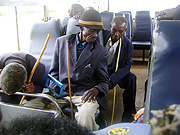There is no doubt that any effort to part cattle keepers with their sticks would be futile. No wonder, Nyagatare district authorities had planned to disarm cattle keepers, until they rightly realized that they would be fighting a losing war.


There is no doubt that any effort to part cattle keepers with their sticks would be futile. No wonder, Nyagatare district authorities had planned to disarm cattle keepers, until they rightly realized that they would be fighting a losing war.
"It is not easy to stop people in this area from carrying the sticks wherever they go. You know they are conditioned to carrying them- that they carry sticks therefore, is a kind of reflex. You cannot follow cows deep in bushes, when you are not armed with a good stick.
It is not only meant to control cows, but also fight off dangerous animals and people,” explains Richard Musimenta, a pastoralist living in Karangazi, Nyagatare district – Eastern province.
Children at tender age of about 4 years or less, start carrying sticks as they help their parents to look after cows, especially the calves.
It is indeed extremely beautiful, to see a baby looking after a ‘cow baby’. This is what strangers would call (naively of course) child labour.
"When white people pass around our villages, they think we are involving children in labour, but they are absolutely wrong. We are actually trying to make them adapt and adopt, to live in harsh and changing pastoral environments. Our livestock is our way of life, children must thus know how to handle it in any given environment,” says Karegeya Samuel, a resident of Nyagatare district.
Positive to note however, is the reality that the pastoral communities in Rwanda often receive adequate education, and children’s educational needs are catered for, regardless of where they grow up, or what type of community they live in.
Children have a right to receive basic education, and this is ensured jointly by the families, community and of course the government.
So carrying sticks and looking after cows, has nothing to do with its classical association of ignorance and illiteracy, in pastoral communities.
There are those young boys that grow up accustomed to carrying sticks that carry them even aboard a vehicle, when old, to travel hundreds of kilometres.
"I cannot leave my stick behind because before I entered this vehicle, I had walked several kilometres in an isolated place, where I could meet wild animals or some aggressive people to fight me.
After getting out of this vehicle, I will also walk so many other kilometres in the wild, before I reach my final destination. I therefore, have to carry my stick even aboard this bus, says Kayitankore Emmanuel (62), a resident of Rwempasha-Nyagatare district.
It is amazing to see how more than half of the passengers in a vehicle carry sticks. In fact, a stranger would be frightened by the mere look at the no-nonsense looking men, armed with sticks.
But alas, they are as harmless as a domestic sheep. However, they can be dangerous when provoked, especially outside the vehicle.
It is thus never advisable to pick a quarrel with them-like many pastoralists around the world, they can harm you. The sticks they use/carry are more of weapons than decorations- a naïve person would go wrong.
It is against this background that authorities had decided to disarm them. They carry the sticks to drinking places and when they are drunk, start fighting using them hence seriously harming each other.
"Carrying sticks wouldn’t be a problem when they are grazing their cows, but the bad thing is that they carry them even in bars. We have cases where people fought and almost killed each other with sticks. That is when we started contemplating disarming them altogether,” says Kanamugire Alphonse, an army veteran living in Ryabega.
Nevertheless, parting cattle keepers with their sticks, would not work, owing to the long time value that they give them. The authorities would fight a losing war-all that is needed is to sensitize them slowly, so that they stop carrying the sticks, in bars for instance.


